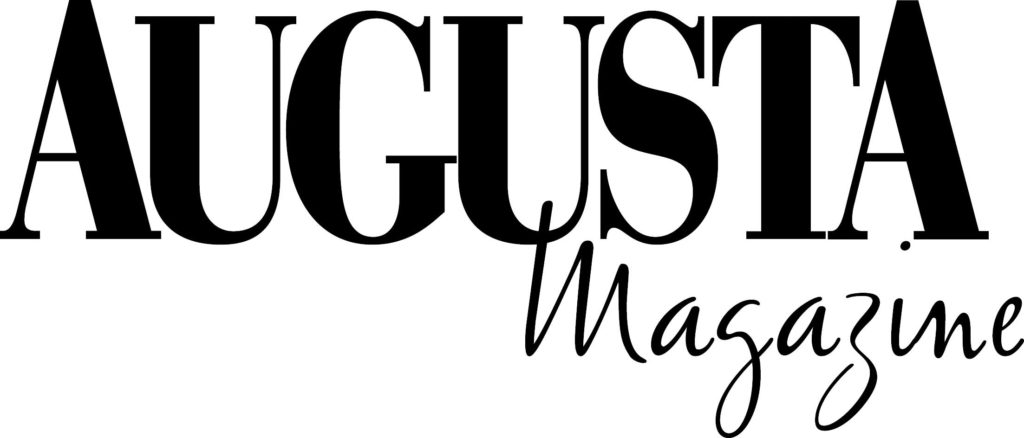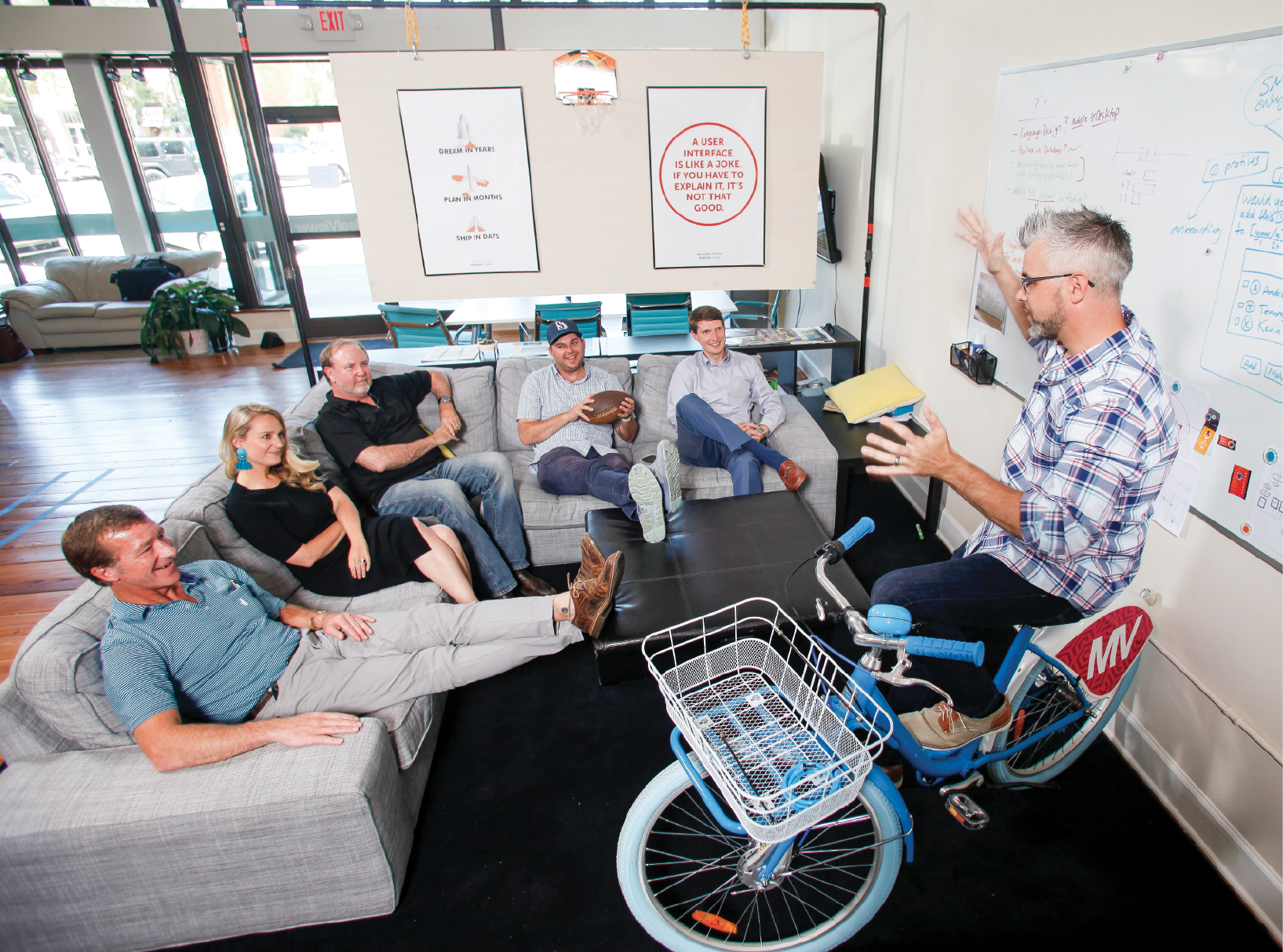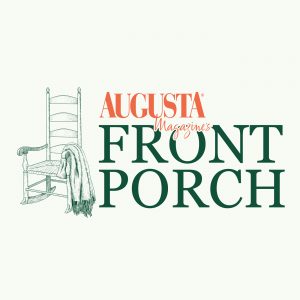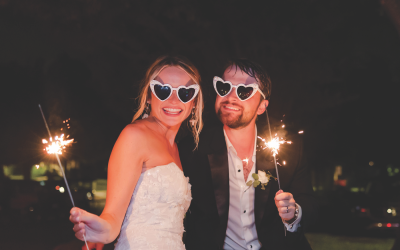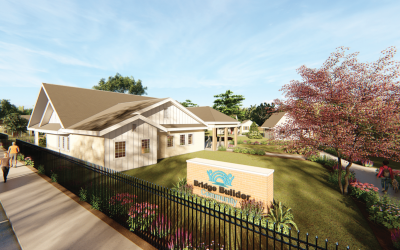It was an ideal mix of personalities and talents: Patterson, the dreamer; Copenhaver, the connector; Virginia Claussen, the marketing guru; George Claussen, the social director; Cates, the legal mind with tech experience; and Wafford, the entrepreneur.
It all started over drinks one night. “It usually does, right?” laughs Virginia Claussen.
The group included Claussen, chief image and creative officer for Copenhaver Consulting; her brother, George, better known as the brains and passion behind Friends With Benefits and Central Avenue’s Southbound Smokehouse restaurant; former mayor turned radio personality Deke Copenhaver; Tommy Wafford, co-founder of the startup MealViewer; John Cates, vice president of acquisitions/development and general counsel at Meybohm; and Tom Patterson, chief trust officer at Unisys—all gathered in the intimate bar area of Oliviana in Surrey Center last August.
It was Patterson who first reached out to Copenhaver with a rough idea for a project downtown that would create a space for millennials to live, work and play, meeting the need for high-tech office space not currently available in downtown and accommodating the influx of creative, technology and cyber industries coming to the region. The brainchild has been dubbed the Augusta Innovation Zone, or iZone for short.
“I came up with the name as a lightning rod,” says Patterson, who had seen similar projects during his time in Silicon Valley.
It worked. “You don’t tell Tom no,” laughed George Claussen. Copenhaver then invited the Claussens to the table over another drinks get-together, along with Cates. Cates then talked to Wafford, whom he had met through a recent Meybohm-sponsored panel discussion featuring Augusta tech leaders, and brought him on board.
It was an ideal mix of personalities and talents: Patterson, the dreamer; Copenhaver, the connector; Virginia Claussen, the marketing guru; George Claussen, the social director; Cates, the legal mind with tech experience; and Wafford, the entrepreneur.
At that initial meeting at Oliviana, the six put a vision down on paper: a block on Broad Street that could be developed into an open-concept, modern co-working space where startups and other small businesses could innovate together and benefit from amenities such as a dedicated receptionist, professional conference rooms and meeting spaces, printing and copier services as well as mentorship, coaching and the opportunity to connect with angel networks. There would be nearby apartments, lending that walkability factor. Restaurants and retail would round out the community, giving dwellers a place to socialize and relax.
It could all have ended there, just a barely sketched out dream, another downtown hit and miss, as people finished their drinks and walked away back to their real jobs and real responsibilities. But the lightning rod lit a spark.
THE LOOK
“Neither of us have degrees in business—our development company was the first company either of us ever owned so we jumped in with both feet and learned to swim. But the Augusta Innovation Zone will definitely be just a larger version of this.”
— Wafford
Near the corner of 11th and Broad, on the first floor of the 130-year-old Emporium Building, Tommy Wafford and his employees at the startup MealViewer are busy throwing darts.
“We just launched v2 and are celebrating,” says Wafford with a grin.
Three years ago, the former youth pastor was assembling the nuts and bolts that would become MealViewer, a digital menu system for school cafeterias designed to grab students’ attention, boost participation rates and—importantly—be easy for school food and nutrition directors to manage. It was the fourth startup for Wafford and his co-founder, Andrew Duke, who had to learn how to find investors, craft pitches and do the hard work of launching and growing a successful business. “Neither of us have degrees in business—our development company was the first company either of us ever owned so we jumped in with both feet and learned to swim,” says Wafford. “But the Augusta Innovation Zone will definitely be just a larger version of this.”
This is the soaring ceilings and modern industrial interior of MealViewer’s corporate offices, designed in open zones centered around an employee lounge area. On the walls are inspiring words: “Passion never fails” and “Hard work beats talent.”
In three years, the startup went from two to 20-plus employees, and last year, with a previous lease coming up, Wafford had four weeks to move into a new location. He found the ideal space on the first floor of the historic Emporium Building, located just where he wanted to be—downtown Augusta. But the construction firm he met with to fit out the open space asked for $100,000 and eight weeks.
That’s when Wafford turned to Pinterest.
The site is a treasure trove for both novice and expert crafters and designers, but also houses a wealth of plans for office spaces. Wafford found what he wanted, met with some framers, and on a $25,000 budget and in just four weeks, carved out a hip, modern office within the historic bones of the building.
Now burnished hardwood floors and white pressed tin ceilings are a backdrop to rustic wood walls, Plexiglass and lengths of pipe creating dividers and office spaces. The lightness and openness of the space are intentional so that employees can brainstorm together, share ideas and yes, play the occasional game of darts.
For the Augusta Innovation Zone, the first step was finding the right buildings. Through various connections, the group made their way to real estate investor Dallas Hooks, owner of the Johnson Building, and T.R. Reddy, a developer and hotelier who purchased downtown’s former Woolworth store in 2015. The location of the two sites was ideal—both being at the corner of 8th and Broad streets.
As the group sees it, the Johnson Building will house apartments, complete with original floor-to-ceiling windows, with a view onto the Woolworth Building. Meanwhile, the roughly 17,000 square feet of the Woolworth Building’s first floor is completely empty save for two long rows of square columns, with an additional 13,500 square feet on the second floor plus a rooftop.
Wafford has spent many lunch hours prowling that first floor, envisioning what the iZone could look like. Cates brought his experience in too. In the early part of his legal career, he represented startup companies in Atlanta and was on the ground floor of the Atlanta Technical Village, a startup hub, which the group has used as its model for the iZone.
And the bones are there. “[Millennials] want an open floor plan. They also don’t want too fine of furnishing. You don’t have to spend that much on the build-out because a lot of these spaces are polished concrete floors; they don’t have dropped ceilings so you just keep the mechanicals exposed but just paint them black. It’s sort of that modern industrial look that’s very popular in places like Atlanta,” says Cates. “That’s great for the Johnson Building and the Woolworth’s building because they’re already that way.”
The first floor will be able to house up to 175 companies, with anywhere from one to six employees. Some of the open space will be devoted to “hot desks” (available on a first-come, first-served basis) as well as reserved desks. And here’s where Wafford’s background in Pinterest comes back in: The remaining space will be fitted out with offices carved out from recycled shipping containers, which are affordable, look stylish and modern when painted and finished, and can house up to six employees. Startups who continue to grow can graduate upstairs to the second floor, which will be configured into larger offices.
LIFE ON BOARD
“[Millennials] want an open floor plan. They also don’t want too fine of furnishing. You don’t have to spend that much on the build-out because a lot of these spaces are polished concrete floors; they don’t have dropped ceilings so you just keep the mechanicals exposed but just paint
them black.”
— Cates
Near the corner of 11th and Broad, on the first floor of the 130-year-old Emporium Building, Tommy Wafford and his
Meanwhile, restaurateur George Claussen’s focus is on the next floor up—the rooftop. The startups won’t just stop at floor two: The roof will house a bar and an incubator for restaurants where chefs can test out new ideas, hopefully see some success and potentially open their own full-scale restaurant. Claussen is working on the concept with Peter Newlin, an Augustan who has opened several successful restaurants in Colorado.
A glass-enclosed food court will allow guests to take in the stunning view of the SunTrust and Lamar buildings, among others—an actual Augusta skyline. “It’s funny,” says Virginia Claussen. “So I actually posted a picture from the rooftop on social media and had a friend who reached out to me and said, ‘Oh my God, you’re in Atlanta, what are you doing downtown?’ and I said, ‘I’m actually in downtown Augusta.’ It really does look like a city from up there.”
For George, that rooftop signifies the futuristic view that the iZone is taking. Selecting the right tenants is paramount. The group is adamant that leases are extended to those companies that are driven by innovation—for example, a shoe store that uses 3D printing to customize soles for runners’ particular needs.
“What the Innovation Zone can be is really the stepping point for the way we want downtown to look,” says George. “We can come in and shape and do this to really help mold the rest of the underdeveloped downtown. If we’re the focal point that everyone is basing off of for the top tier of business, what Augusta needs, then people have got to strive to do things bigger and better than what we’re doing.
“When I was young, I remember this same stretch, being on 8th Street and on the river, Riverwalk and Fat Man’s,” he adds. “Everybody was down there…and that was just where we went. I don’t know what happened, why it didn’t transition, but it didn’t. Now we have a second chance at it.”
When she first moved to Los Angeles, Virginia worked out of an accelerator similar to an incubator. “They attract tons of millennials and a lot of people in their early 20s, early 30s that have these startup companies but don’t have anywhere to work. That’s exactly what it did for me,” says Virginia, who worked as a brand manager for international high-end designers.
But when she came back to Augusta looking for the same thing, she found exactly nothing. “Originally I wanted to move downtown, but I couldn’t find anywhere to live, to be honest. So I think that’s exactly what the Augusta Innovation Zone is going to do; it’s going to provide people a place to work, to live and to play. We’re going to have so many urban dwellers moving here with cyber command, and they’re going to want to live in the urban core, which is downtown. They’re going to want to work down here. And the Augusta Innovation Zone will be able to provide that.”
“There is zero high-tech class A office space in downtown Augusta,” says Cates bluntly. “It doesn’t exist. So if people want a nice place to work if they are in a creative or technical or even cybersecurity industry—there is nowhere for them to be currently. So what we have found this that there is [also] high demand for people who want to collaborate…”
Which is why their timeline is aggressive by choice: The group is looking for the Innovation Zone to be open by the end of 2017. It’s a little shocking to an Augusta public accustomed to seeing things move at an incremental pace. “We need to have that mindset—‘Why can’t we do it?’ not ‘It can’t be done,’” says Copenhaver. “I love that this is driven by the private sector. It’s not like we’re going to the city and asking for things. I do believe that transformational change in cities that I’ve studied has been driven by the private sector and not necessarily the public sector…Cities can redevelop. And once it starts changing, it can change fast.”
And changes are happening. Not only the Augusta Innovation Zone, but Gov. Nathan Deal has announced a $50 million Georgia Cyber Innovation and Training Center at Augusta University’s Riverfront campus. The Augusta Convention and Visitors Bureau will open a new location at the site of the former White House Antiques. The Usry family, who owns Fat Man’s Café and Catering, purchased two buildings on the 10th block of Broad. Plus, two new hotels are going up, one on Broad Street at the former Capital City Bank location and the other on Reynolds near the Augusta Convention Center.
“What the Innovation Zone can be is really the stepping point for the way we want downtown to look,”
— Claussen
“We’re starting with 8th Street obviously,” says Virginia. “This is further down the beaten path, which I think is necessary for us to develop another part of Broad. And we hope it continues to go all the way down, and we hope that starting with this one block, it will inspire others to do the same thing.”
Even with construction barely begun, the Innovation Zone has already committed 60 percent of the second floor to interested companies and has a waiting list of about 50 startups interested in co-working on the first floor. Meanwhile, Cates and Wafford are also working at recruiting companies from across nation to relocate to Augusta.
“Companies don’t move to San Francisco because the WiFi’s better. They move there because that’s where the money is,” says Wafford. “There are literally thousands of companies every year that are good, solid companies with good core business models that would make money if they got funded that go under because they never do get funded. And you can find them at [conferences like] South by Southwest, Pitch Days in San Francisco, the dropouts of Y Combinator who don’t get funded, and they’re looking now at secondary sources because their first attempt at funding didn’t work. Well, we’re going to recruit those companies because we have an advantage in Augusta that no one else offers: cost of living. So I can double your runway, and the Internet’s just as good here. But I can also connect you with an incubator that has $50 million in funding. Well then, I can give almost anyone a shot at a company.”
And fun fact: Fortune magazine recently published a story on the seven cities that could become the world’s cybersecurity capital. Among cities like London, Tel Aviv and Washington, D.C. is Augusta, Ga. And Forbes recently published an article on how Augusta is becoming a model for tech innovation in small cities, featuring the Augusta Innovation Zone.
“I think the biggest thing about all of this is that we really want to do this project to just show people in our city that you can do it. I feel like for so long there’s been this idea of ‘Man, when is downtown going to come together? When is it going to be everything we know it could be?’… Well, it’s time to realize that potential. And you don’t do it by forming a committee and talking about it. You do it by putting some plans together, working out the finances and executing on them. So we hope that this is going to be a way for everybody to look around and go, ‘Wow, if they did that over on 8th Street, what could we do?’”
And the best part of the story? None of the six are being paid for their work on the project. That was another decision made at that very first meeting at Oliviana. “Everybody wants to see it work, and they’re betting on this little group of people who are doing it in a completely altruistic way,” says Patterson. “We’re going to make it happen and we’re going to make it happen for the whole city.”
“Everybody wants to see it work, and they’re betting on this little group of people who are doing it in a completely altruistic way. We’re going to make it happen and we’re going to make it happen for the whole city.”
— Patterson
This article appears in the June/July 2017 issue of Augusta Magazine.
